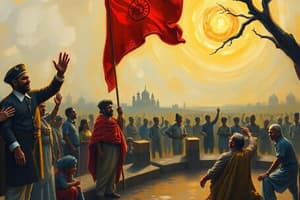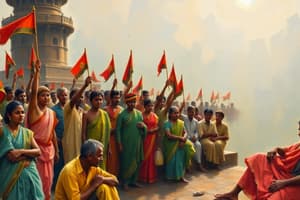Podcast
Questions and Answers
What was the main goal of the boycott of British goods during the Swadeshi movement?
What was the main goal of the boycott of British goods during the Swadeshi movement?
- To increase India's dependence on British imports
- To stimulate the domestic economy (correct)
- To strengthen British colonial rule
- To promote British goods over Indian goods
What event triggered the boycott of British goods in the Swadeshi movement?
What event triggered the boycott of British goods in the Swadeshi movement?
- The British decision to support Indian industries
- The partition of Bengal by the British in 1905 (correct)
- The signing of a trade agreement between India and Britain
- The promotion of Indian textiles by the British government
What concept was reinforced by the term 'Swadeshi' in the context of the Swadeshi movement?
What concept was reinforced by the term 'Swadeshi' in the context of the Swadeshi movement?
- Boosting international trade relations
- Supporting Indian goods (correct)
- Encouraging dependency on British products
- Promoting foreign imports
How did the Swadeshi movement impact the Indian economy?
How did the Swadeshi movement impact the Indian economy?
Which term best describes the sentiment behind the Swadeshi movement's promotion of Indian goods?
Which term best describes the sentiment behind the Swadeshi movement's promotion of Indian goods?
What was one of the primary reasons for the emergence of the Swadeshi movement in early 20th century India?
What was one of the primary reasons for the emergence of the Swadeshi movement in early 20th century India?
What was the main objective of the Swadeshi movement in India?
What was the main objective of the Swadeshi movement in India?
Who among the following leaders advocated for a revolutionary approach to Indian independence during the Swadeshi movement?
Who among the following leaders advocated for a revolutionary approach to Indian independence during the Swadeshi movement?
How did the Swadeshi movement impact the Indian economy?
How did the Swadeshi movement impact the Indian economy?
Which leader's call for 'Swaraj' (self-rule) significantly contributed to the Swadeshi movement in Maharashtra?
Which leader's call for 'Swaraj' (self-rule) significantly contributed to the Swadeshi movement in Maharashtra?
What was one of the key impacts of boycotting British goods during the Swadeshi movement?
What was one of the key impacts of boycotting British goods during the Swadeshi movement?
Which movement was closely tied to the Swadeshi movement in India?
Which movement was closely tied to the Swadeshi movement in India?
Study Notes
Swadeshi Movement: Reclaiming Self-Reliance and National Pride
The Swadeshi movement, a resurgence of nationalist sentiment in India, emerged as a response to British colonial rule in the early 20th century. This significant social and political movement sought to foster self-reliance and economic independence, championing Indian goods and rejecting foreign imports. By exploring its four primary aspects — boycott of British goods, promotion of Indian goods, nationalism, and the roles of influential leaders — we gain a comprehensive understanding of the Swadeshi movement's history, contributions, and legacy.
Boycott of British Goods
The Swadeshi movement began in response to the British government's decision to partition Bengal in 1905. This partition was intended to create a new province, and it sparked widespread protests from local Indians who saw it as an attempt to divide the region along religious lines. In response, Indian nationalists called for a boycott of all British goods, including clothing, textiles, and other manufactured items. This boycott, reinforced by the phrase "Swadeshi" (meaning "from one's own country"), aimed to reduce India's dependence on British imports and stimulate the domestic economy.
Promotion of Indian Goods
The Swadeshi movement also emphasized the importance of supporting and fostering Indian industries and goods. During this time, the Indian economy was heavily reliant on the United Kingdom, and the Swadeshi movement encouraged Indians to shift their purchasing habits towards locally produced goods. This shift was not only seen as a means of economic independence but also as a way to foster national pride and promote Indian culture.
Nationalism
The Swadeshi movement was closely tied to the broader nationalist movement in India, which aimed to secure independence from British rule. By promoting self-reliance and rejecting British goods, Indian nationalists hoped to demonstrate their ability to govern themselves and to create a strong, independent nation. The Swadeshi movement was closely connected to other forms of Indian nationalism, including nonviolent civil disobedience campaigns led by Mahatma Gandhi.
Role of Leaders
Several influential leaders played key roles in the Swadeshi movement. One of the most prominent figures was Bal Gangadhar Tilak, whose call for "Swaraj" (self-rule) spurred the swadeshi movement in Maharashtra. Another notable figure was Aurobindo Ghosh, who advocated for a revolutionary approach to Indian independence. In Bengal, Swami Vivekananda and Aurobindo Ghosh played significant roles in the Swadeshi movement. These leaders helped to shape the movement and to give it a powerful voice and vision for the future.
Impact on the Indian Economy
The Swadeshi movement had a profound impact on the Indian economy. The boycott of British goods led to a decrease in foreign imports, while the promotion of Indian goods stimulated domestic production and trade. This shift in economic behavior had a transformative effect on the Indian economy, which was slowly beginning to emerge from the shackles of colonial rule.
The Swadeshi movement's legacy is complex, and its impact on India's history continues to be debated and discussed by scholars and historians. However, it is clear that the Swadeshi movement played a crucial role in shaping India's national identity and in promoting self-reliance and economic independence. The movement continues to serve as a powerful reminder of the importance of nationalism, local production, and economic independence in modern India.
Studying That Suits You
Use AI to generate personalized quizzes and flashcards to suit your learning preferences.
Description
Explore the Swadeshi movement in colonial India, a significant nationalist movement that promoted self-reliance and economic independence. Learn about the boycott of British goods, the promotion of Indian goods, nationalism, and the influential leaders who shaped this movement.




